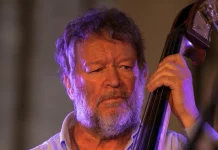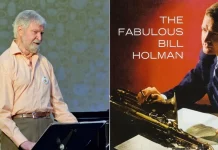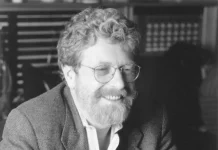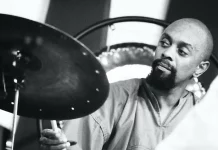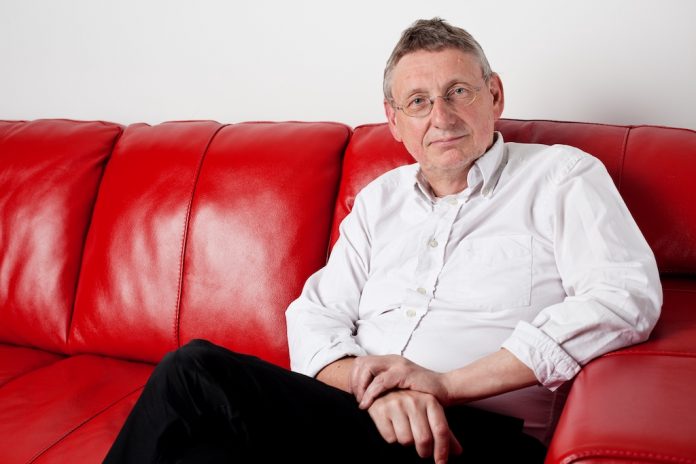
John Cumming, probably the leading promoter of jazz in Britain in the modern period, died 17 May 2020 after the recurrence of a cancer diagnosed in 2019.
The company he helped form, Serious, issued the following summary of John’s outstanding efforts in bringing live jazz of all varieties to the UK, and below that is reproduced Michael Tucker’s profile of John, first published in Jazz Journal in November 2015.
From Serious, 19 May:
John loved jazz, theatre and especially his family. He met the love of his life, his wife Ginnie, when they were studying at Edinburgh University, and they had a daughter, Kate.
From the late 1960s, he worked primarily in theatre as a director, lighting designer and occasional writer. As well as designing lights for Lindsay Kemp and the Welfare State, he co-founded the Pool Theatre in Edinburgh. Although he is celebrated for his work in music, it was that sense of theatre that drove him to create inspiring festivals and produce extraordinary musical collaborations.
John joined South Hill Park Arts Centre in 1973 to run the theatre and music programmes, and started the Bracknell Jazz Festival, building it into an international platform for contemporary jazz and improvised music. Turning freelance in 1977, he worked as a production and tour manager for Contemporary Music Network in the UK, and internationally for George Russell (creating the Anglo-American Living Time Orchestra), Carla Bley and Charlie Haden’s Liberation Orchestra. He programmed the Camden Jazz Week and continued to work as lighting designer for the Albany Empire, IOU Theatre Company and Mike Westbrook.
In the mid-80s, he founded Serious Productions with John Ellson, working with Orphy Robinson, Andy Sheppard and John Surman. David Jones joined them to form Serious Speakout in 1992 and they launched what has become one of the world’s great music festivals, the EFG London Jazz Festival. In 1996, Claire Whitaker joined, and they formed Serious as it is known today.
John loved pushing at the boundaries of jazz, reclaiming and underlining the radical inspiration of the music and exploring links with hip-hop and dance culture. He was close to so many major American artists, including Cecil Taylor, Max Roach, Jack DeJohnette and Robert Glasper, but he was particularly passionate about the creative forces inside European jazz. He touched many lives in the UK jazz scene and it gave him great satisfaction that he lived to see a new generation of jazz musicians delighting huge audiences.
John was at his best when he worked closely with colleagues and partners, sharing ideas, drinks, enthusiasms and elliptical Scottish jokes (“What is a Partick Thistle?” asked one bemused tour manager), and helping Serious to develop younger producers who have gone on to work across the world. He received awards for services to jazz at both the BBC Jazz Awards and the Parliamentary Jazz Awards, and in 2014 he was made an OBE for Services to Jazz.
John stepped back from Serious last year, but he stayed connected right to the end. Just a couple of weeks ago, he was working on the European tour of his last international production, Harlem Hellfighters, which featured a new generation of young musicians from Tomorrow’s Warriors working with Jason Moran. Combining film, literature, theatre and a dazzling range of black music, it was a complex and thrilling piece – a final statement by an inspiring producer who was loved by everyone who knew him.
Michael Tucker’s profile of John Cumming from Jazz Journal, November 2015:
John Cumming has played a key role in the promotion of jazz in the UK. Having known him since the fabled days of the Bracknell Festival, I was delighted when in 2014 John was awarded an OBE for his many services to jazz. On the eve of this year’s EFG London Jazz Festival, he spoke to me about the early days, the philosophy of the production company Serious, and the many factors which feed into one of the biggest festivals in the world.
“I got into promoting and producing jazz through sheer enthusiasm for the music and what it stands for. I grew up in Edinburgh, and as a teenager the city’s Traverse Theatre – still a really forward-looking venue – and, a few years later, its University Jazz Club, got me started. Later, visits to the Richmond and Windsor jazz festivals plus the impact of Jazz On A Summer’s Day fed into the idea of the 1970s summer festival at South Hill Park in Bracknell. It’s been good to work recently with Love Supreme in Sussex and see another approach to an outdoor festival become a success.
“Obviously, over the years there have been many changes: in jazz itself, in the economic and cultural landscape, in the way social media affect how artists, producers and audiences can communicate. Jazz has always had the ability to reinvent itself, drawing in new generations and fresh energy, and responding to the changes around it. The biggest challenge for us at Serious is to maintain a momentum and a continuity for our work, that can adapt to external pressures and somehow remain stable amidst changes in the economic environment, audience patterns and the circuit of venues around the country. Whatever the future may bring, the key factors for us will always be quality and integrity.
‘None of us would want to gainsay the massive impact that the African-American tradition has had and the LJF will always have that core jazz energy and aspiration at its heart’
“The LJF evolved out of the Camden Jazz Festival, in the early 1990s, when it was clear that something fundamental had shifted in the axis of the music. None of us would want to gainsay the massive impact that the African-American tradition has had and the LJF will always have that core jazz energy and aspiration at its heart. If you asked me for a single stand-out memory from all the years of the festival, it would be the run of Barbican concerts by Sonny Rollins – one of the world’s greatest performers, in any genre. But from the early 1960s on, the impact of British, European and Scandinavian musicians has been vital, helping shape the expanded world scene and potential we have now. Whitney’s Balliett’s famous one-liner, ‘jazz is the Sound of Surprise’, has more resonance than ever.
“At Serious we try to create such surprise in various ways: not just in the programming, but through, e.g., the freestage events and also putting the music in unexpected places like the Sam Wanamaker Playhouse. And then there are outreach projects such as the 150-piece choir of North London teenagers we assembled to work with Hugh Masekela and the Jazz Jamaica All Stars. We’re developing new projects now with Chris Sharkey and Adrian Adewale, both presented as works-in-progress at this year’s festival.
“I’ve always seen the value of learning and participation, for all ages, to be an integral part of our work. This goes back to Bracknell, where we ran the festival in the context of a major community arts centre. We now run the London Jazz Festival and so, naturally, the city itself helps define what we do. We always had this at the heart of the festival’s vision: we wanted jazz to function as a vital part of the city, creating dynamic links with many different and historically evolving communities. At bottom, we’re inclusive in our approach, so we will continue to try and find ways to help both develop and demystify the music, getting jazz out to the widest possible audience – or rather, audiences.
“The jazz scene can’t operate in a bubble: it runs against the essence of the music for jazz not to engage with the world around it. For us that raises, e.g., matters of gender and diversity, media outreach and the major issue of London’s relation with the regions – ensuring that we work with our regional partners to tour artists out of the festival, and that we bring artists into the festival from all those mines of talent in, e.g., Manchester, Bristol, Leeds, the North-East and Scotland. Whatever the future work-load, I’ll always get a massive buzz from the live gig!”

